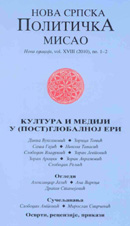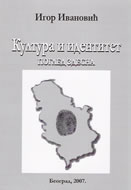| NSPM in English | |||
European Disunion |
 |
 |
 |
| уторак, 05. август 2008. | |
|
The original European project as it developed out of World War II was geared towards promoting economic recovery and constraining Germany The beginning was modest: the European Coal and Steel Community. That successively turned into the European Economic Community (or Common Market) and the European Union. Cooperation has become consolidation as ambitious Eurocrats seek to create another superpower, one prepared to reduce U.S. dominance and share global influence with America. And the EU has the formal requisites of superpower status. The 27 members of the European Union possess a collective population of about 500 million, compared to America’s 300 million, and last year enjoyed a combined GDP of $16.62 trillion, compared to $13.84 trillion for the United States. But united the EU is not. Members took different positions on the Iraq War, disagree violently over the desirability of including Turkey and cannot agree on recognizing Kosovo as an independent state. Binding America’s states together into the United States singular as opposed to plural required a bloody interstate conflict. Europeans instead have been united by their (laudable) desire to avoid war. The result is no United States of Europe singular. Left to its own devices, the EU—governed by a European Commission and European Parliament, limited by member-state vetoes, represented by a temporary, rotating president, and denied effective control over members’ foreign and military policies—isn’t going to achieve geopolitical (in contrast to economic) influence matching that of China or Russia, let alone the United States. Which led to the Lisbon Treaty. Don’t mind the details. The purpose of the complicated accord, which started out as a formal constitution before being rejected in referendums in France and the Netherlands in 2005, is to create something approximating a superstate to compete with America (and, presumably, any other eventual great power). But the only way to do that is to submerge national power and identity by, for instance, stripping countries of their guaranteed member of the European Commission and veto of major policy changes. Alas for the Eurocrats, polls indicate that the majority of Europeans do not share this continental corporate vision. So it must be imposed on the masses. French President Nicolas Sarkozy, whose government has just taken over the EU’s rotating presidency, was refreshingly honest when he observed: “There will be no treaty at all if we had a referendum in France.” Which is why twenty-six of twenty-seven members refused to put the issue to a vote of their citizens. Polls indicate that a majority of people in every EU country wants to vote, and likely would vote no in sixteen of them, including the continent’s most important power, Germany. So parliaments, not peoples, were tasked to decide the issue. Except in Ireland, where the constitution mandates a popular vote. Despite Irish contrariness evidenced by their refusal in 2002 to ratify the Nice Treaty (reversed in a second vote the following year), which advanced EU consolidation, the European elite assumed victory would be theirs. The major Irish political parties all backed the treaty and Eurocrats trooped to Dublin to proclaim the wonders of the new Europe. It apparently never occurred to the “new class” of politicians, bureaucrats, lobbyists, activists and intellectuals that run the EU that common people might not be in tune with their goals as well as their methods. So when the Irish voted no in June, there was consternation in the capitals of Europe, and especially Brussels, home of the EU bureaucracy. Classic was the comment of Germany’s interior minister, Wolfgang Schaeuble: “A few million Irish cannot decide on behalf of 495 million Europeans.” Minister Schaeuble, of course, believed that the job of deciding belonged to a few thousand Eurocrats. With unanimity required, the Irish vote should have killed the Lisbon Treaty. But the response from chanceries, parliaments, and agencies across Europe was: we expected a yes, politicians in Dublin promised a yes, we insist on a yes. Although there continues to be some talk of bumping Ireland to second-class status or even kicking the Emerald Isle out of the EU, the consensus is that a second vote has to be held. And the Irish people must be made to vote the right way. Some Eurocrats advocate political inducements, such as allowing Ireland to keep its national commissioner. Others propose an intensified propaganda campaign. Everyone insists on putting pressure on Dublin: hold another referendum and do it right this time. Last week Italy became the twenty-third nation to ratify Lisbon, and the Eurocrats hope to reach twenty-six soon. Nicolas Sarkozy journeyed to Ireland to make sure the Irish government was listening. But the strategy has run aground. If Prime Minister Brian Cowen calls another vote and loses, his job likely is forfeit. And, no surprise, Irish voters have not taken kindly to Sarkozy’s variant of the Brezhnev Doctrine: a no vote is only temporary, while a yes vote is forever. A poll by the Irish company Red C, commissioned by Open Europe, found that 71 percent of Irish voters oppose holding a second referendum. Moreover, 17 percent of proponents would shift into opposition, while only six percent would do the reverse. Nonvoters in June expressed themselves 57 percent to 26 percent against. Maybe the Eurocrats can turn this all around before a vote next year, but don’t count on it. And even if they get their way with Ireland, the result won’t be what they really desire: a Europe capable of competing with the United States and other great powers. A quasi nation which can be constructed only by preventing people from voting, and by coercing those who do vote, is not going to generate the sort of loyalty, let alone enthusiasm, needed to forge a new nationality. Some Americans may be over the top in believing their country to be unique and tasked with a special global mission, but that conviction (delusion?) has helped drive an active U.S. policy abroad. Europe has nothing comparable—who in Europe, other than a few Belgians, perhaps, is prepared to die for Brussels?—and the Lisbon Treaty can’t create it ex nihilo. Equally important, even a consolidated EU will not have the most important tool of international relations: a real military. Nicolas Sarkozy has proposed new EU forces, and former–German Foreign Minister Joschka Fischer also recently called for greater continental military cooperation. But the likelihood that any European government other than France will respond seriously is barely above nil. Last year the Europeans spent about $312 billion, less than half of America’s total outlays, on defense. But much of that money was wasted on large, inefficient conscript forces. EU members have little lift capability. During the Kosovo conflict, European officials admitted that they possessed barely 10 to 15 percent of America’s combat capabilities. And about the same proportion of Europeans are prepared to use military force. Other than the British and Dutch, EU forces in Afghanistan have done as much as possible to avoid conflict. In principle there’s nothing wrong, and much right, with this attitude. Even Russia poses little threat to Europe, Old or New, to use Donald Rumsfeld’s famous dichotomy. Why go to war if you don’t have to? However, the EU members aren’t going to match America’s geopolitical power without an effective military, since that means they have little useful to say in the most serious conflicts. And they certainly won’t get much respect as long as they continue to rely on the U.S. to defend them. So long as the EU expects Washington to do Europe’s dirty work—promoting largely European interests, as when the U.S. bombed Serbia over Kosovo and advanced NATO to Russia’s border—Washington will never have any reason to take the Europeans seriously on geopolitical questions. Political figures in Brussels may whine about not having a decision-making role, but why should anyone listen to them unless they start spending money and taking risks? Their biggest failure in Afghanistan is not failing to provide meaningful combat forces in areas where combat is occurring, but professing to believe that Afghanistan is important, and then failing to provide meaningful combat forces in areas where combat is occurring. The Bush administration has formally blessed EU consolidation, though it is not obviously in America’s interest. A Brussels-dominated foreign and military policy is just as likely to hinder U.S. goals as advance them. And strengthening central continental control almost certainly means reducing the liberty of average Europeans, but then, that has not been a particularly cherished value in Europe for years. In any case, whatever the impact on America, the decision is Europe’s. But the decision doesn’t really matter. The Lisbon project is a dead end. Popular nationalism drove America’s process of consolidation. There are Europeans today, but only in the sense of Germans not really being Germans or Belgians not really being Belgians. Forcing through the Lisbon Treaty only illustrates the lack of national identity on the continent. Combine that with a determined unwillingness to acquire, let alone wield, meaningful military force, and the EU will remain a paper tiger. The twenty-first century could end up being another American Century or the Chinese Century. It will not be the European Century. Doug Bandow is the Robert A. Taft Fellow at the American Conservative Defense Alliance. He is a former special assistant to President Ronald Reagan and the author of several books, including Foreign Follies: America’s New Global Empire (Xulon). (05.08. 2008, The National Interest) |
Од истог аутора
- France Falls Again
- The End of Nonproliferation
- Riyadh Scores One for Tehran
- Fear and Exhilaration in America
- Conservatives for Empire
- Departing Europe
- Bankrupt Empire
- Europe Doesn’t Matter
- Ukraine’s Counterrevolution
- A War We Can’t Afford
- Holier Than Thou
- Guns & Butter
- The China Syndrome
- More Friends, More War
- The Russian Hangover
Остали чланци у рубрици
- Playing With Fire in Ukraine
- Kosovo as a res extra commercium and the alchemy of colonization
- The Balkans XX years after NATO aggression: the case of the Republic of Srpska – past, present and future
- Из архиве - Remarks Before the Foreign Affairs Committee of the European Parliament
- Dysfunction in the Balkans - Can the Post-Yugoslav Settlement Survive?
- Serbia’s latest would-be savior is a modernizer, a strongman - or both
- Why the Ukraine Crisis Is the West’s Fault
- The Ghosts of World War I Circle over Ukraine
- Nato's action plan in Ukraine is right out of Dr Strangelove
- Why Yanukovych Said No to Europe

.jpg)





















